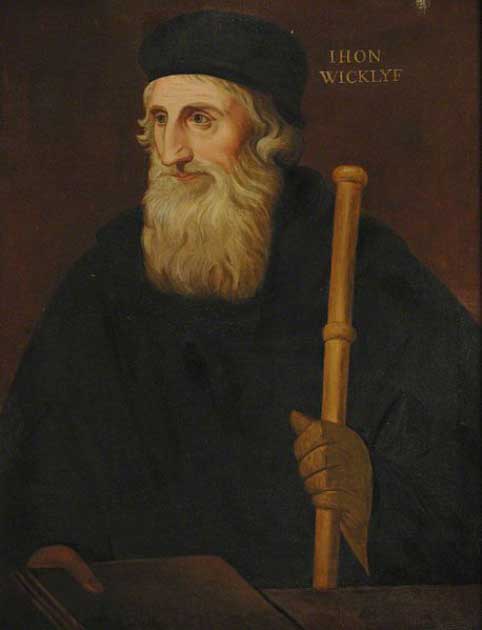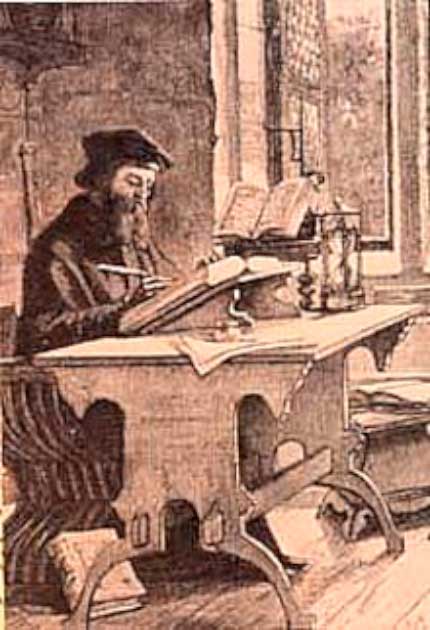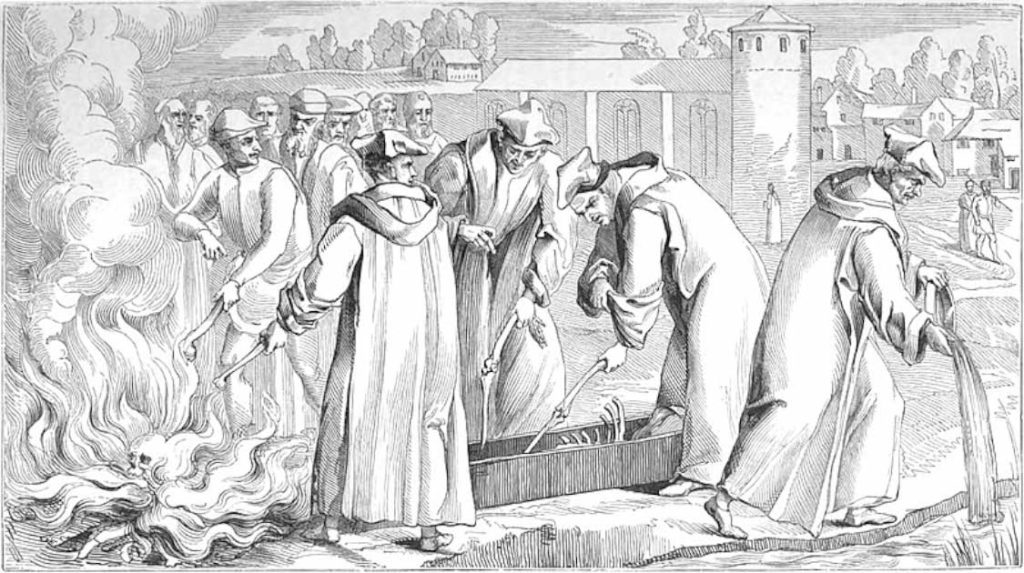Over the centuries the Bible has gone through various iterations and been translated into many different languages. The problem has always been that the writers and translators of these adaptations have tended to add their views to the Bible.
This has led to some major controversies. Perhaps most controversial of all was the Wycliffe Bible, the first attempt to produce an English-language Bible. Its production made its creator, John Wycliffe a pariah in the Catholic Church. So what was the Wycliffe Bible and what made it so troublesome?
What was the Wycliffe Bible?
From 1382 to 1395 John Wycliffe made a concerted effort to produce a Middle English version of the Bible. These Middle English translations are commonly known as Wycliffe’s Bible.
Up until this point, most Western Christians had only had access to Bibles written in Latin. The problem was that very few people besides the clergy could read, let alone understand, Latin. This was just as the Church wanted it.
The version used by the Church during this period was known as the Vulgate. The “original” bibles had been translated from Hebrew and Greek by Saint Jerome and his associates. The Catholic church considered the Vulgate to be the de facto word of God. There were to be no translations.

Wycliffe (as was his habit) disagreed with the Catholic Church. He reasoned that the Vulgate was already a translation in and of itself, so why not translate it once more into a language normal people actually used?
He started work in the early 1380s and his first version was released in 1382. This work was printed via a technique called xylography, also known as woodblock printing.
Unsurprisingly, his version of the Bible quickly became a bestseller. Many people in England were devoutly religious and eager to experience the word of God for themselves. While most people couldn’t read, they could always find someone who could read Wycliffe’s work to them.
There are two different versions of the Wycliffe Bible. The first was released during Wycliffe’s lifetime. It is a word-for-word, literal translation of the Latin vulgate with very few if any deviations.
- King Josiah: the Man Who Wrote the Bible?
- Why was the Infancy Gospel of Thomas Excluded from the Bible?
It included the standard biblical text, the Apocrypha (or deuterocanonical texts to the Roman Catholics, additional biblical stories which fall outside the strict canon) as well as 3 Esdras and Paul’s epistle to the Laodiceans.
The second version was released 10 to 12 years after Wycliffe’s death and was translated by John Purvey. In the first version, some parts of the texts were confusing or almost meaningless thanks to the text’s word-for-word style of translation (try using google translate to translate the same text multiple times and see how much sense it makes). The second version of the Bible aimed to solve these issues by using proper idiomatic English as part of the translation process.
For the most part, Wycliffe’s bibles didn’t add anything new to the version of the Bible that Catholic priests were using in their sermons all over Europe at the time. This doesn’t mean the Catholic church was happy. Not at all.
Was Wycliffe Helped?
For a long time, it was believed that Wycliffe was solely responsible for producing the Wycliffe Bible. These days it is believed that he had some help. Nicholas of Hereford (a reformer and biblical scholar), John Purvey, and John Trevisa (a Cornish writer and translator) are now also associated with helping Wycliffe translate the Bible.
Still, it was Wycliffe’s baby. John Wycliffe was an English theologian, priest, scholar, and most importantly, rebel. Wycliffe objected to the many abuses being carried out by the Medieval church daily and hated that the church seemed more concerned with political matters than ethical ones.
Throughout his life, Wycliffe constantly challenged papal authority and often criticized the popes and the church hierarchy as corrupt and land-greedy. Ultimately Wycliffe was a man of the people. He felt that the church had grown greedy and should stop acquiring wealth.

Instead, he believed the church should give up its riches and follow in the footsteps of Jesus and the Apostles by living in a state of poverty. The biblical text should be made as accessible to the common man as possible, not gate kept by the church behind a dead language that only the clergy could speak.
A Challenge to Orthodoxy
Unsurprisingly, Wycliffe producing a Bible which allowed the common man to check if the church had been teaching God’s word or their own met with fierce resistance. By its release, Wycliffe was already unpopular with the church’s senior figures. They did not react well to the release of his translation. They saw it as a direct challenge to the rule of the church.
Part of the problem was any translation of biblical texts had to be approved by the Catholic church. Wycliffe had gone ahead without this approval, knowing full well it would be unforthcoming. Worse, Wycliffe held some beliefs that the church considered heretical.
In particular, Wycliffe was not a fan of transubstantiation (the transformation during mass of bread and wine into the blood and flesh of Christ). He believed it to be unbiblical and claimed it was a relatively new addition to church doctrine, with little theological backing.
- The Holy Foreskin: Where is the Last Piece of the Body of Christ?
- Asherah: did the God of the Hebrew Bible have a Wife?
This was only the tip of the iceberg, however: over a millennia of accreted Catholic teachings could now be fact-checked by anyone who could read, or be read to. Relics, Papal dispensations, doctrine and charitable donations to the poor, even the concept of crusading, all had no Biblical support.
The release of his Bible led to Wycliffe being blamed for the peasant revolt of 1381. The people of England had risen and revolted against the English government and how it favored the wealthy over the poor.
Wycliffe had condemned the revolt outright but the fact his Bible had been released to challenge the accepted social order and religious establishment (and empower the people) meant he was associated with the revolt nonetheless. Blame the messenger, indeed.
Wycliffe was accused of heresy and the “Blackfriar’s Synod” was formed with the sole purpose of removing Wycliffe from his teaching position at Oxford. The synod was successful in doing this and ultimately led to King Richard II ruling that anyone who preached or wrote against the church should be imprisoned.

Even once he was dead the church remained furious at what Wycliffe had done. On 4th May 1415, over 30 years after his death, Wycliffe was officially branded a heretic and banned from the church. His books were burned and his body was exhumed. It was then burnt and its ashes were thrown into the River Swift in Lutterworth.
To Shine a Light in Dark Places
Ultimately, Wycliffe’s Bible was more important for what it started than what it was. The translation itself had very little influence on future English bibles.
Later translators such as William Tyndale (of the Tyndale Bible) and Miles Coversdale (of the Great Bible) ignored Wycliffe’s work entirely and chose to translate directly from the original Greek and Hebrew. Later Protestant biblical scholars ignored the Wycliffe Bible also, seeing as it contained the parts of the Catholic Bible they disagreed with.
This doesn’t mean Wycliffe’s Bible wasn’t important and hasn’t had a lasting impact on religious history. Even after his death Wycliffe’s followers, known as Lollards, were vitally important in printing and disseminating an English version of the Bible that normal people could actually understand and derive their own understanding from. It may have fallen out of use eventually but for a long time, the Wycliffe Bible was the average peasant’s preferred text.
Wycliffe’s lasting legacy is a reminder of what happens when power goes unchecked. Wycliffe was a rebel and his Bible was an open challenge to a corrupt church that dominated every aspect of daily life.
Wycliffe challenged that power with the most powerful tool at his disposal. The spreading of knowledge. His Bible helped, in the end, bring on a reformation that changed the Christian world forever.
Top Image: John Wycliffe reads his Bible to John of Gaunt, father of King Henry IV (it’s complicated). Source: Ford Madox Brown / Public Domain.